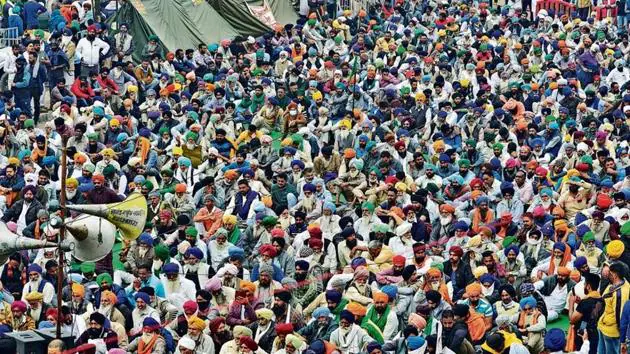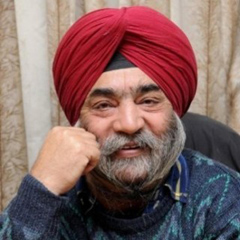

“Though the agitation had nothing to do with Sikhs or Sikhism, yet the larger participation of Punjab farmers, who are mostly Sikhs, and the whole hearted support from various democratic organizations the world over, provided a lever to a strong vocal section of the ruling Bharatiya Janata Party, especially its IT Cell, to dub the peaceful agitators as “separatists”, “Khalistanis”, naxalites” or even “Maoists”. Even some Union Ministers were not far behind in heaping these allegations.”
A massive and unprecedented agitation, exemplified by the unity and discipline of the agitators, forced the might of the majority government of the biggest democracy of the world to relent and take back the three controversial Farm laws. Besides there was an apology to the nation by the Government for not being able to convince the benefactors, the farmers, the real intent of these legislations.
The farmers, owing allegiance to the Samyukt Kisan Morcha (SKM) – an umbrella organization of 40-odd Kisan Unions – were understandably jubilant and cautious in assimilating the congratulatory retreat of the State. The farmers felt that the battle has been won but war of attrition would continue until their sworn demand of getting legal sanctity to the Minimum Support Price (MSP) was accomplished.
The agitation that started on November 26 at the Singha barrier on the outskirts of Delhi has already devoured 669 lives. The Samyukt Kisan Morcha (SKM) now wants a memorial to keep alive their sacrifices.
Dramatic turn of events on the Parkash Utsav of the founder of Sikhism, Sri Guru Nanak Dev Ji, not only came as a pleasant surprise for the agitators but also to the rest of the world as till that day there was no indication of asolution to the nearly year-long struggle for repeal of “Black Laws”.
The announcement held an emotional appeal for Sikh farmers as Sri Guru Nanak Dev ji spent last 17 years of his life as a farmer at Kartarpur Sahib in Narowal district, now in Pakistan. Reopening of the Sri Kartarpur Sahib corridor was also an additional softening factor.
Those who followed this agitation religiously link the November 19 unilateral announcement by the Prime Minister Narendra Modi to the earlier important events of the Sikh history.
On December 20 last year, a surprise visit of Prime Minister Modi to Gurdwara Raqabganj in New Delhi to pay obeisance to the ninth Sikh Guru, Sri Guru Teg Bahadur, was probably intended to assuage the hurt feelings of the Sikh community over the unsavory comments made by his party leaders during the ongoing stir. It was probably the time when the idea to repeal the Farm Laws germinated and took 11 months before culminating into a historic pronouncement for which even the consent of the Union Cabinet was overlooked. Even on the birth anniversary of Sri Guru Gobind Singh Ji in January this year, rapid developments had the Prime Minister on the verge of making a decision. The post-Independence history is punctuated with examples where farmers agitated peacefully and forced the State to concede their demands. Memories would still be fresh in the minds of those who witnessed the week-long siege of Punjab Raj Bhavan in 1984.
Farmers argue that agriculture was not a profession but a way of living and allowing its takeover by the corporates would sound its death knell. They maintained that if the laws had been made for their benefit then why they were not consulted or taken in confidence while drafting them.
Leading the agitators were some seasoned leaders. And one of them of the 1984 vintage, Balbir Singh Rajewal, who still holds the reins of the farmers movement in the country, while others in command, including Rakesh Tikait, have been second generation leaders. Leadership played a stellar role in keeping the agitators together, peaceful and disciplined even while negating the State moves to divide them.
The historic triumph of people’s struggle against a stubborn Government is not without its wide political ramifications as it propels a new phase of politics that may augur well for the future of democracy in the country.
Elections to five States, including Punjab and Uttar Pradesh, are due early next year. And the stakes for the ruling BJP are very high, especially in Uttar Pradesh and Uttarakhand. Though the agitation had nothing to do with Sikhs or Sikhism, yet the larger participation of Punjab farmers, who are mostly Sikhs, and the wholeheartedsupport fromvarious democraticorganizations the world over, provided a lever to a strong vocal section of the ruling Bharatiya Janata Party, especially its IT Cell, to dub the peaceful agitators as “separatists”, “Khalistanis”, naxalites” or even “Maoists”. Even some Union Ministers were not far behind in heaping these allegations.
One of the major casualties of this agitation has been the oldest political alliance between Shiromani Akali Dal and the Bharatiya Janta Party. After reorganization of the State in 1966, BJP had been playing junior partner to the SAD in contesting 23 of 117 Assembly seats of the State Legislature.
Now it wants to contest all 117 seats on its own unless it gets into a new alliance with a new political outfit – Punjab Lok Congress – of the displaced Punjab Chief Minister, Capt Amarinder Singh.
How the master stroke played by Prime Minister Modi to appease Sikhs works in the ensuing assembly elections will be watched with bated interest as a semi-final to the 2024 general elections.
Interestingly, the farmers refused to be lured by any politician or any political party and succeeded in keeping their agitation apolitical. Realizing that the elections were round the corner, the farmers resorted to aggressive tactics of opposing the BJP leaders space to campaign in Punjab, Haryana and western UP by resorting to ‘gherao’ of local leaders and state Ministers during their constituency or official visits.
The BJP’s image suffered a major setback after protests in Lakhimpur Kheri resulted in the death of seven people leading to the arrest of the son of a Union Minister. The Supreme Court had to intervene by ordering a judicial probe into the incident. With farmers also insisting on sending delegations towards Parliament, the situation could have stirred the cauldron of protest further. The immediate task before the SKM, that held a mahapanchayat in Lucknow on November 22, is to get its six demands conceded by the government. Besides the legal guarantee for minimum support price, the farmers are demanding the removal of Union Minister of State for Home Ajay Mishra, whose son is an accused in the Lakhimpur Kheri violence, withdrawal of cases against farmers, building a memorial to the protesters who lost their lives during the agitation and withdrawal of the Electricity Amendment Bill.
(The author is a senior journalist. He can be reached at prabhjot416@gmail.com)
(First published in The Liberal.com)





Be the first to comment